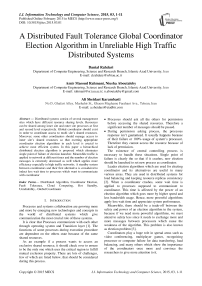A Distributed Fault Tolerance Global Coordinator Election Algorithm in Unreliable High Traffic Distributed Systems
Автор: Danial Rahdari, Amir Masoud Rahmani, Niusha Aboutaleby, Ali Sheidaei Karambasti
Журнал: International Journal of Information Technology and Computer Science(IJITCS) @ijitcs
Статья в выпуске: 3 Vol. 7, 2015 года.
Бесплатный доступ
Distributed systems consist of several management sites which have different resource sharing levels. Resources can be shared among inner site and outer site processes at first and second level respectively. Global coordinator should exist in order to coordinate access to multi site’s shared resources. Moreover; some other coordinators should manage access to inner site’s shared resources so that exerting appropriate coordinator election algorithms in each level is crucial to achieve most efficient system. In this paper a hierarchical distributed election algorithm is proposed which eliminates single point of failure of election launcher. Meanwhile traffic is applied to network at different times and the number of election messages is extremely decreased as well which applies more efficiency especially in high traffic networks. A standby system between coordinators and their first alternative is considered to induct less wait time to processes which want to communicate with coordinator.
Distributed Algorithm, Coordinator Election, Fault Tolerance, Cloud Computing, Hot Standby, Unreliability, Global Coordinator
Короткий адрес: https://sciup.org/15012256
IDR: 15012256
Список литературы A Distributed Fault Tolerance Global Coordinator Election Algorithm in Unreliable High Traffic Distributed Systems
- Shirali M, Hagighattoroghi A, Vojdani M, Leader Election Algorithms: History and Novel Schemes. 7th International Conference on Computer and Information Technology, 2008, 452-456.
- Obeidat A, Gubarev V. Leader Election in peer to peer systems, Siberian conference on control and communications,2009, 25-31.
- Park S. A Stable Election Protocol Based on Unreliable failure detector in Distributed Systems, Eighth International Conference on Information Technology New Generations, 2011, 979-984.
- Garcia Molina H. Elections in a Distributed Computing System, IEEE Trans. Comp, vol.31, no.1, 1982, 48-59.
- Fredrickson N and Lynch N. Electing a Leader in Asynchronous Ring, Journal of ACM, vol.34, no.1, 2007, 98-115.
- Datta, A, Larmore L, Vemula P. An O(n)–time self–stabilizing leader election algorithm, Journal of Parallel Distributed Computing ,vol.71, no.11, 2011,1532-1544.
- Shi W, Srimani P K. Leader election in hierarchical star network, Journal Parallel Distributed Computing, vol.65, nom 11, 2005, 1435-1442.
- Bakhshi R, Endrullis J, Fokkink W, Pang J. Fast leader election in anonymous rings with bounded expected delay, Journal of Information Processing Letters, vol.111, no.17, 2011, 864-870.
- Delporte-Gallet C, Devismes B, Fauconnier H. Stabilizing leader election in partial synchronous system with crash failure, Journal of Parallel and Distributed Computing, vol.70, nom.1, 2008, 45-58.
- Effatparvar M, Effatparvar M R, Bemana M, Dehghan A. Determining a Central Controlling Processor with Fault Tolerant Method in Distributed System, 2007, 658 – 663.
- Mirakhorli M, Sharifloo A, Abaspour M. A Novel Method for Leader Election Algorithm, 7th IEEE International Conference on Computer and Information Technology, 2007, 452-456.
- Effatparvar M R, Yazdani N, Effatparvar M, Dadlani M, Khonsari A. Improved Algorithm for Leader Election in Distributed Systems, second International Conference on Computer Engineering and Technology, ,2007, 6 – 10.
- Villadangos J, Cordoba A, Farina F, Prieto M. Efficient leader election in complete networks, Pro of the 13th Euro micros conference on Parallel, Distributed and Network-Based Processing, 2005, 136-143.
- Rahdari D, Rahmani A.M, Arabshahi A. A Novel Message Efficient Fault Tolerant Coordinator Election Algorithm in Bidirectional Ring Networks, Journal of Information Technology and Computer Science, Vol.5m no.1, 2012 , 15 - 25, 2012.


